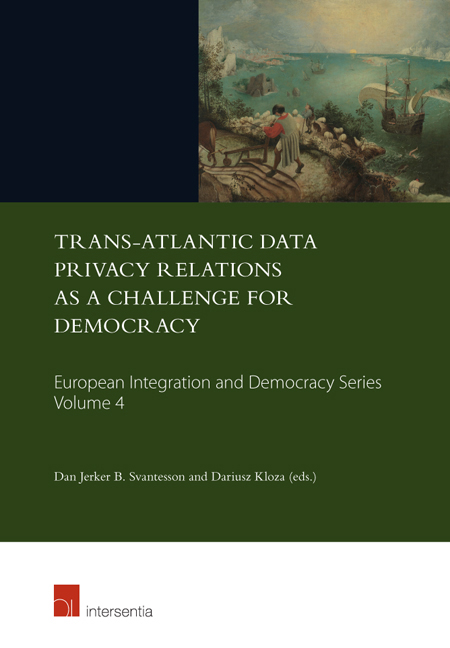Book contents
- Frontmatter
- Foreword
- Preface
- Contents
- List of Abbreviations
- PART I PRIVACY AND …
- SECTION I PRIVACY AND TRANSBORDER FLOWS OF PERSONAL DATA
- INVITED COMMENTS
- SECTION II PRIVACY AND INTERNATIONAL TRADE
- INVITED COMMENT
- SECTION III PRIVACY AND TERRITORIAL APPLICATION OF THE LAW
- SECTION IV PRIVACY AND CRIME
- INVITED COMMENTS
- 13 Terrorism and Paedophilia on the Internet: A Global and Balanced Cyber-Rights Response Is Required to Combat Cybercrime, Not Knee-Jerk Regulation
- 14 Understanding the Perpetuation of ‘Failure’ : The 15th Anniversary of the US Terrorist Finance Tracking Programme
- SECTION V PRIVACY AND TIME INVITED COMMENTS
- PART II THEORY OF PRIVACY
- PART III ALTERNATIVE APPROACHES TO THE PROTECTION OF PRIVACY
- INVITED COMMENT
- CONCLUSION
14 - Understanding the Perpetuation of ‘Failure’ : The 15th Anniversary of the US Terrorist Finance Tracking Programme
from INVITED COMMENTS
Published online by Cambridge University Press: 29 September 2018
- Frontmatter
- Foreword
- Preface
- Contents
- List of Abbreviations
- PART I PRIVACY AND …
- SECTION I PRIVACY AND TRANSBORDER FLOWS OF PERSONAL DATA
- INVITED COMMENTS
- SECTION II PRIVACY AND INTERNATIONAL TRADE
- INVITED COMMENT
- SECTION III PRIVACY AND TERRITORIAL APPLICATION OF THE LAW
- SECTION IV PRIVACY AND CRIME
- INVITED COMMENTS
- 13 Terrorism and Paedophilia on the Internet: A Global and Balanced Cyber-Rights Response Is Required to Combat Cybercrime, Not Knee-Jerk Regulation
- 14 Understanding the Perpetuation of ‘Failure’ : The 15th Anniversary of the US Terrorist Finance Tracking Programme
- SECTION V PRIVACY AND TIME INVITED COMMENTS
- PART II THEORY OF PRIVACY
- PART III ALTERNATIVE APPROACHES TO THE PROTECTION OF PRIVACY
- INVITED COMMENT
- CONCLUSION
Summary
Surveillance, ancient reality, only becomes modern traceability when it is performed within an organized system, whose extension suggests that it is a genuine societal project, pursued by private powers as much as public powers … Traceability implies three elements: It would require traces and thus a medium to identify them; it would require traces registration mechanism; finally it would require a structure to process and analyse them in order to draw conclusions Without this type of organisation – which implies a certain voluntarism – traces exist, traceability does not
As a government technology of people and things, traceability is not as such a state monopoly, and certainly not a counterterrorism specificity Indeed, the three elements of traceability are united in a range of social, commercial, professional, health care and food safety configurations, to name a few Studies have underlined the historicity and multiple uses of traces related to objects and subjects acting and/or circulating in the physical world or the cyberspace With these remarks, it is worth noting that contemporaneous security programmes with dataveillance capabilities for counterterrorism purposes are extensively based on traceability Apart from the emphasis on signal intelligence (SIGINT) arising from the 2013 US National Security Agency (NSA) surveillance scandal, the abbreviation FININT highlights another type of security configuration, among the myriad of acronyms used to distinguish various sources and methods of intelligence.
With reference to FININT, US Treasury officials in particular have promoted ‘the development of a new discipline for acquiring and analyzing financial intelligence’ for numerous years, especially with the Terrorist Finance Tracking Program (TFTP) According to Juan C Zarate, the first assistant secretary of the Treasury for terrorist financing and financial crime:
financial intelligence can be defined in many ways In its broader sense, financial intelligence is any bit of information – however acquired – that reveals commercial or financial transactions and money flows, assets and capital data, and the financial and commercial relationships and interests of individuals, networks, and organizations Such information can come in a variety of forms – crumpled receipts found in terrorist safe houses, the detail ledgers of hawaladars, suspicious transaction reports from banks, and transnational wire-transfers records …
- Type
- Chapter
- Information
- Publisher: IntersentiaPrint publication year: 2017

